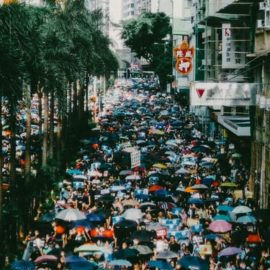

This article is an excerpt from the Shortform book guide to "The Wealth of Nations" by Adam Smith. Shortform has the world's best summaries and analyses of books you should be reading.
Like this article? Sign up for a free trial here.
What happens when the government meddles with the economy? What do regulated markets produce (or fail to produce)?
The development of a nation’s wealth depends on competitive markets in which participants are free to act in their own self-interest. In The Wealth of Nations, Adam Smith identifies government policies that interfere with this process and slow down economic growth.
We’ll explore two regulated market policies that Smith critiques: restricting international trade and subsidizing industries.
Policy #1: Restrictions on International Trade
Many governments try to grow their nation’s wealth by preventing the import of foreign goods that would out-compete domestic manufacturers. Either the country bans importing foreign goods completely (an embargo), or it imposes high taxes on the foreign goods to prevent them from being competitive in domestic markets (tariffs). Smith contends that these regulated markets—those in which international trade is restricted—cause three problems.
Problem #1
Smith contends that embargoes and tariffs are ineffective at achieving their goals because they create stronger incentives for smugglers trying to get around the rules. An embargo has the effect of drastically restricting the supply while leaving the demand unchanged. The resulting high prices will encourage merchants to pursue their self-interest by smuggling the tariffed or embargoed goods into the country.
Problem #2
When trade isn’t restricted, domestic consumers and businesses can save money by buying cheaper foreign imports and using their savings to invest in profitable industries at home. Those domestic producers can then put their capital into something that would be more profitable to make in their countries. When trade is restricted, governments artificially prop up unprofitable industries while making consumers pay a higher price for the goods these industries produce. This results in lower economic growth.
Problem #3
The size of the market determines the degree to which specialization of labor can occur. By trading with each other, countries are able to access larger markets, supporting greater specialization of labor in each country. Smith also contends that countries don’t “lose” money by buying more goods from another country than they sell to that same country. Money traded for imports is still exchanged for goods, which also adds to the nation’s overall wealth.
Policy #2: Subsidies
Another restrictive policy Smith identifies is a subsidy. Subsidies are policies in which governments directly give money to a particular industry or business. The goal is to support this industry and encourage growth in this particular sector by lowering the cost of production. This allows companies to sell their goods at a lower price, artificially making the industry more profitable. Smith explains that subsidies misdirect investment capital in two ways.
First, subsidies move capital directly by collecting it through taxes and giving it to the subsidized industry. This redirects capital by taking it out of the hands of private investors who would otherwise naturally seek out the most productive labor and grow the economy but are instead compelled to invest in the subsidized industry.
Second, by artificially making an industry more profitable, subsidies encourage capital investors to prioritize this industry over others. This redirects capital away from industries that would be profitable without the subsidy and therefore away from industries that would grow the nation’s wealth more efficiently.
(Shortform note: Governments often use subsidies to give domestic producers a competitive advantage in international trade. For example, if country A subsidizes wheat production, while country B does not, country A’s wheat exporters could sell their products at a lower price internationally, undercutting the wheat industry of country B. Therefore, free trade agreements tend to include restrictions on subsidies for exports. In particular, the World Trade Organization prohibits subsidies that increase export performance or disadvantage industries in other member states.)

———End of Preview———
Like what you just read? Read the rest of the world's best book summary and analysis of Adam Smith's "The Wealth of Nations" at Shortform.
Here's what you'll find in our full The Wealth of Nations summary:
- The 1776 classic that set the groundwork for the field of economics
- Adam Smith's ideas about markets, international trade, and government
- How governments can accidentally encourage smuggling






